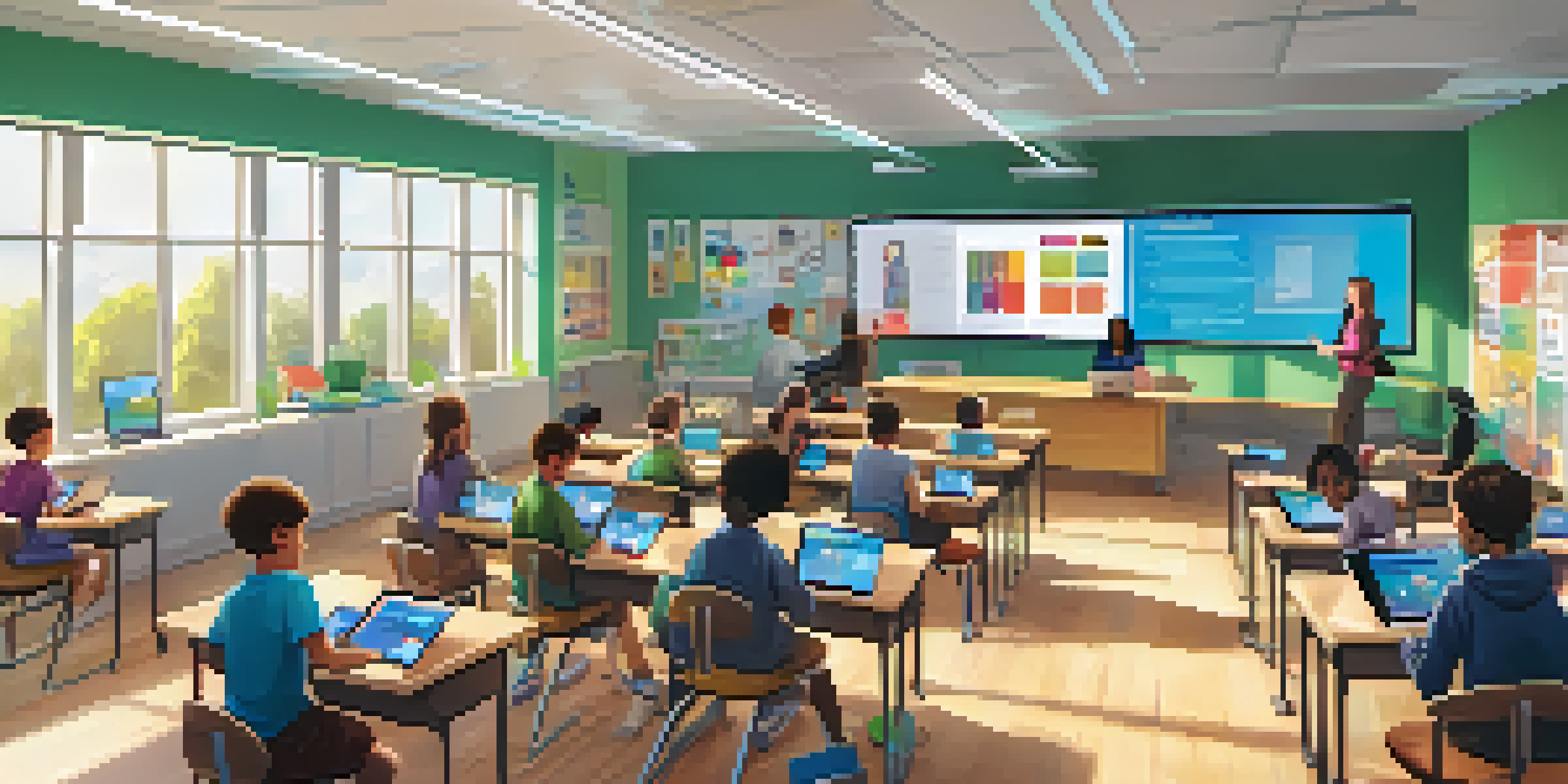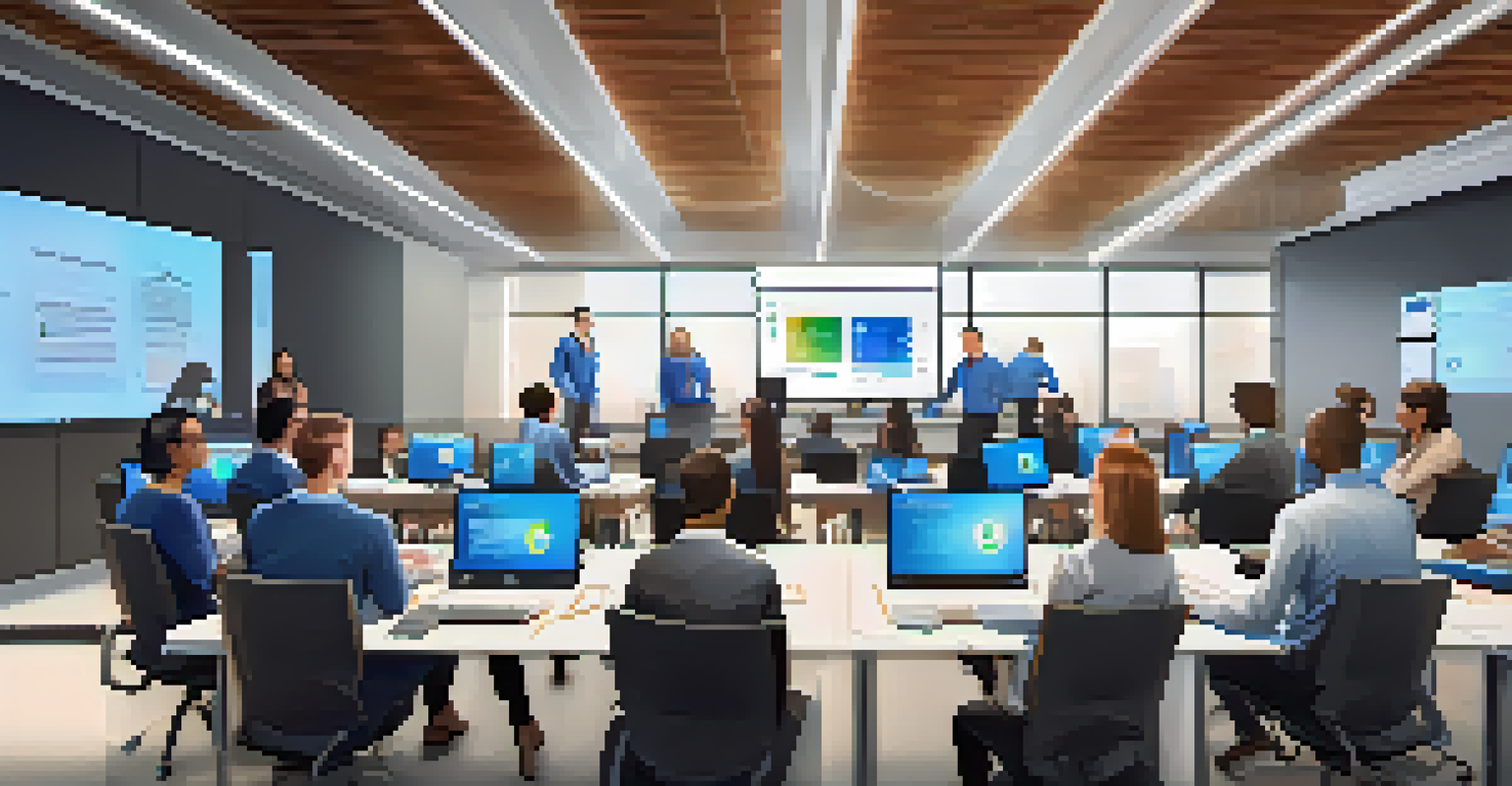Case Studies: Successful Implementation of Adaptive Learning

Understanding Adaptive Learning: A Brief Overview
Adaptive learning is an educational approach that personalizes the learning experience based on individual needs and performance. Imagine a classroom where each student follows a unique path to mastery, rather than a one-size-fits-all model. This method uses technology to assess learners in real-time, adjusting content and difficulty to optimize their educational journey.
Education is not the filling of a pail, but the lighting of a fire.
At its core, adaptive learning leverages data to create a tailored experience for each student. For example, if a student struggles with a particular concept, the system can provide additional resources or alternate explanations to help them grasp it better. This dynamic nature not only enhances comprehension but also keeps students engaged and motivated.
Many educational institutions have begun integrating adaptive learning into their curricula, and the results have been promising. From K-12 schools to universities, the personalized approach has shown significant improvements in student outcomes, making it a topic worth exploring further.
Case Study 1: Success in K-12 Education
One standout example of adaptive learning in K-12 education is the implementation at a school district in California. Here, educators adopted an adaptive learning platform that tailored math instruction for each student. As a result, students who previously struggled with math began to show marked improvements in their understanding and skills.

Teachers reported that the platform allowed them to identify individual learning gaps and adjust their teaching strategies accordingly. For instance, they could assign specific practice problems based on a student’s performance, ensuring that no one was left behind. This personalized approach not only boosted academic performance but also increased student confidence.
Personalized Learning Experience
Adaptive learning tailors education to individual needs, enhancing engagement and comprehension.
Feedback from both students and parents highlighted a newfound enthusiasm for learning. The district's impressive results underline the potential of adaptive learning to transform educational experiences for young learners.
Case Study 2: Higher Education Innovations
In the realm of higher education, a university in Texas successfully integrated adaptive learning into its introductory statistics course. The program utilized an online platform that adapted to each student's progress, providing targeted resources and assessments. This approach led to a significant increase in course completion rates and overall student satisfaction.
The future of education is not in the classroom but in the cloud.
Students appreciated the flexibility of learning at their own pace, which was particularly beneficial for those balancing studies with work or other commitments. Additionally, instructors found that they could spend more time on complex topics, knowing that students had a solid foundation thanks to the adaptive system.
This case study illustrates how adaptive learning can enhance not only academic performance but also the overall educational experience in higher education settings. The results speak volumes about the effectiveness of personalized learning approaches.
Case Study 3: Corporate Training Success
Adaptive learning isn't just limited to traditional education; it has found success in corporate training as well. A major technology company implemented an adaptive learning system for its employee onboarding process, which tailored training modules to each new hire's prior knowledge and skills. This innovative approach significantly reduced the time required for onboarding.
By adjusting the training content based on individual performance, the company ensured that employees received relevant information without unnecessary repetition. This efficiency not only saved time but also increased employee engagement and retention of knowledge.
Successful Case Studies
Real-world examples from K-12 and higher education demonstrate significant improvements in student outcomes through adaptive learning.
The success of this adaptive learning initiative demonstrated that personalized training can lead to a more competent workforce, ultimately benefiting the organization as a whole. This case exemplifies how adaptive learning can revolutionize training in various sectors.
Key Benefits of Adaptive Learning
The case studies discussed highlight several key benefits of adaptive learning. First and foremost, it fosters personalized education, allowing each student to learn at their own pace and according to their unique needs. This individualized approach can lead to improved retention and understanding of the material.
Another significant advantage is the real-time feedback provided by adaptive learning systems. Educators can quickly identify struggling students and intervene with targeted support, ensuring that no one falls behind. This proactive approach cultivates a supportive learning environment.
Lastly, adaptive learning promotes greater engagement among students. When learners see that their education is tailored specifically for them, they are more likely to stay motivated and invested in their progress. These benefits make a compelling case for the broader implementation of adaptive learning strategies.
Challenges in Implementing Adaptive Learning
While the benefits of adaptive learning are clear, implementing such systems comes with its own set of challenges. One major hurdle is the initial investment in technology and training. Schools and organizations may need to allocate significant resources to acquire the right tools and ensure that staff are adequately prepared to use them.
Another challenge is the potential resistance from educators who may feel threatened by the shift towards technology-driven instruction. It's essential to foster a culture of collaboration, where teachers see adaptive learning as a complement to their expertise rather than a replacement.
Future Growth Potential
The advancement of technology promises a more effective and widespread adoption of adaptive learning across various sectors.
Finally, maintaining the quality of content within adaptive learning systems can be daunting. As educational needs evolve, it's crucial to continuously update and refine the materials available to ensure they remain relevant and effective. Addressing these challenges is vital for the successful implementation of adaptive learning.
The Future of Adaptive Learning
Looking ahead, the future of adaptive learning appears promising. As technology continues to advance, we can expect even more sophisticated systems that incorporate artificial intelligence and machine learning. These innovations will enhance the ability to personalize learning experiences, making them more effective than ever before.
Moreover, as more educational institutions and organizations recognize the benefits of adaptive learning, its adoption is likely to grow. This shift will not only improve individual learning outcomes but also contribute to a more equitable education system, where every learner has the opportunity to succeed.

Ultimately, the future of adaptive learning holds the potential to transform education across various sectors. By embracing this innovative approach, we can create more inclusive and effective learning environments that cater to the diverse needs of students and employees alike.
Conclusion: Embracing Adaptive Learning
In conclusion, the successful implementation of adaptive learning across different educational landscapes is a testament to its effectiveness. The case studies highlighted in this article demonstrate how personalized approaches can lead to significant improvements in learning outcomes and student engagement. As we move forward, embracing adaptive learning will be key to addressing the diverse needs of learners in our increasingly complex world.
Educational institutions and organizations that invest in adaptive learning technologies not only enhance their teaching methods but also empower students and employees to take charge of their own learning journeys. This empowerment is crucial for fostering lifelong learners who can adapt to the ever-changing demands of society.
As we continue to explore and develop adaptive learning strategies, we can look forward to a future where education is more personalized, accessible, and effective for all. The journey may have its challenges, but the rewards are well worth the effort.